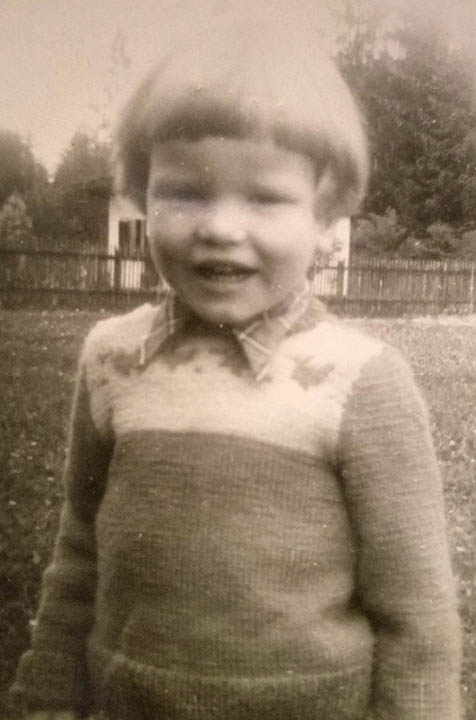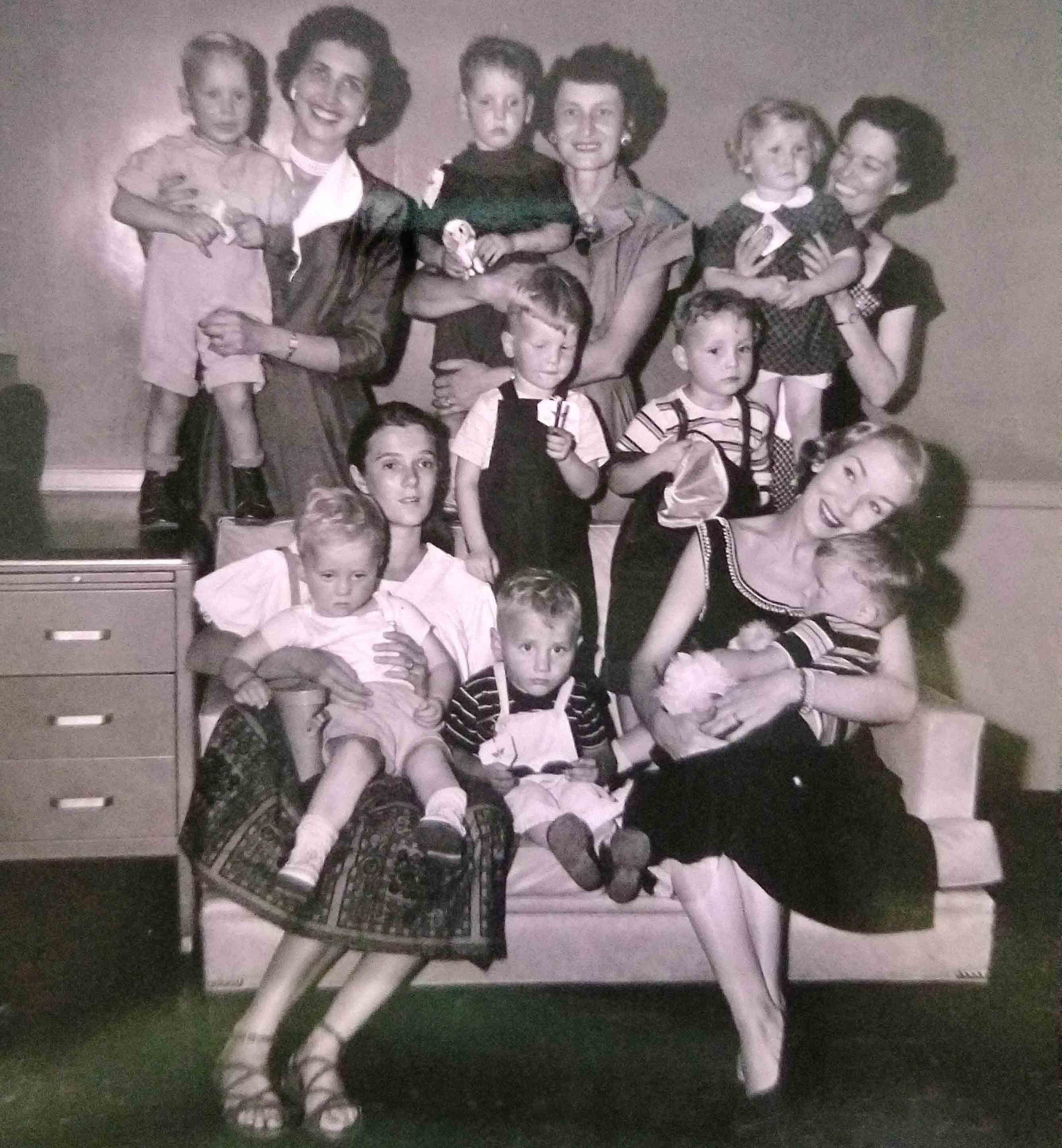Frankfurt, (U.S. zone)
City archive: Stadtarchiv Frankfurt am Main
Münzgasse 9
60311 Frankfurt am Main - Innenstadt
Telephone: +49 69 21 23 84 25
Fax: +49 69 21 23 07 53
Institut für
Stadtgeschichte, Ihre Ansprechpartner: http://www.stadtgeschichte-ffm.de/service/intern/ansprechpartner.html
city archives: https://www.frankfurt-tourismus.de/en/Media/Events/Frankfurt-city-archives-at-the-Institute-for-city-history
Institut für Stadtgeschichte, Städtisches
Archiv: http://www.stadtgeschichte-ffm.de/abteilungen/st_archiv.html
University of Frankfurt
Psychoanalysis and the Holocaust
http://www.ifs.uni-frankfurt.de/people/van_gelder/e_pa_so.html "Do you know that over a
period of twenty-five years, between 1922 and 1947, seventy million Europeans
- men, women and children - have been uprooted, deported, killed?" -- Albert Camus, in his Nobel Prize acceptance speech of 1957 Fränkische
Landeszeitung (newspaper) article dated Nov. 27, 1946:
Headline: "Number
of kidnapped persons"
Dateline: Frankfurt.
"All together 550,372 kidnapped persons were on 30 October in the US zone of
Germany. In October 28,408 persons were returned
to their homeland; 2,453,789 kidnapped persons were repatriated and 8,508 settled
in Germany."
Hi Olga,
Need your help please. My dad was a displaced person who got immigration visa from the IRO Frankfurt/M Le al Office. Is there a data base with registration numbers I can do research? I believe he lived in the Frankfurt area. Is there any way to find out about his life in Frankfurt; 1944 to 1951? Thank you kindly, Andre
Frankfurt-Oder
Collegienstrasse 8 - 9
15230 Frankfurt (Oder)
Tel: 03 35 - 6 80 30 04
Fax: 03 35 - 6 80 27 73
http://www.frankfurt-oder.de/archiv/
Frauenalb -
Dear Ms Kaczmar,
Thanking you for your informative website. My question that I hope you can assist with,
that both parents (now deceased) were Polish Nationals. Father in concentration camp and my
late mother forced labour in Germany 1941. I am NOT a US citizen and currently live in Australia.
I have information that states my birth was probably in DP camp in Frauenalb 1946. I am trying to get an apostillated birth certificate for EU passport.
The thing is, I have contacted the Standesamt in Ettlingen, Marxzell, Karlsruhe in an attempt to obtain a copy of birth certificate. There are NO records in or around Frauenalb etc.
At one stage I did have the original (now lost). I can recall that the certificate had the US emblem stamped on same, stating US Armed Forces- American Sector.
My late father appears to have been employed by the US Armed Forces as an Civilian Guard Staff Sergeant. (I have a reference signed by a 1st Lt at the 7812 European Command Labor Service Rep Centre in Fulda dated 15 Dec 1948)
I also have records stating my parents along with my brother and myself were in Ludendorf Kaserne and Bleidornkaserne (which I believe were US Military establishments.) (Father spoke English well and acted as an interpreter.)
The family at that stage were applying for immigration to . Could it have been possible that my father registered my birth along with my brother with the US Army were he was working and possibly living within the barracks? As there are NO records at the relevant Standesamts.
I did read that if employed by the US Army or living within the compound it was not obligatory to register with the Standesamts.
Are you able to shed some light whether this could have been feasible with your experience with post WW11? Not having much luck with the German Consuls or US Consuls.
I thank you for your hard work and any assistance or information that may assist.
ps have noticed that the birth certificates were "sighted". Certificates No 10 & 66/1947 Sincerely, Magdalena Everett (nee TARASIN) maggiee@optusnet.com.au
Frauendorf - is a municipality in the Oberspreewald-Lausitz district, in southern Brandenburg, Germany.
Freihaus-
July 4, 2013 Hi Olga.
The ITS in Bad Arolsen had sent me a summary of DP camps my family went through in Germany between 1943 and 1951. In October of 1943, my parents were located in "Camp Freihaus" (note: most of the other locations in their summary are identified as "DP Camps", this one is listed as a "Camp"). Google doesn't identify it as an existing town or village. Are you aware of it's existence?
My father and mother had been taken from Poland and were working on a German farm during that time period (October 1943). After the war, they were initially settled in private homes that were made available for DPs, and then moved through a number of DP camps. Is it possible these homes or communities were referred to as "Camps" before the war (and as "DP Camps" after the war?)?
Thank you. Caz Nizman caznizman@sympatico.ca
Olga's reply: I have nothing in the Nazi National Lager system for Freihaus.There may have been civilian workers around there assigned to persons who had sons at war or in the military front. Nazis had penal camps as well as civilian camps. German called lager. Ukrainians called it tabori (camp). Polish – oboz, obozowac. Freihaus is free house; it might not be a town; check out Wikipedia’s explanation: legally in. Lived outside in the countryside, but were part of the city.
DP stands for displaced persons after 1945 when UNRRA and IRO took over the Nazi civilian lagers. They were able to return folks back to their native countries. With the exception of the many Poles who came back to German when they realized Stalin occupied Poland. As UNRRA closed down camps, they moved people further to still open camps. Some DPs like the Ukrainians refused to go home and were routed to 113 other countries.
Definition of a displaced person
As used in a Congressional Bill, the term, Displaced Person means "a person in Germany, Austria, or Italy at the time of the passage of this Act who (1) is out of his country of former residence as a result of events subsequent to the outbreak of World War II; and (2) is unable or unwilling to return to the country to his nationality or former residence because of persecution or his fear of persecution on account of race, religion, or political opinions."
Freiburg
City archives:
http://www.freiburg.de
Street address:
Stadtarchiv Freiburg im Breisgau
Grünwälderstrasse 15 / Salzstrasse 18
79098 Freiburg
Tel: 0761/201-2701
Fax: 0761/201-2799
E-Mail: stadtarchiv@stadt.freiburg.de
http://www.frsw.de
Forced labor at Freiburg
http://search.yahoo.com
Bundesarchiv Militärarchiv (Military archive)
Post box: 79024 Freiburg i. Br.
Street address: Wiesentalstr. 10
79115 Freiburg i. Br.
Tel.: 0761.478 17 - 0
E-mail: militaerarchiv@barch.bund.de
Internet: www.bundesarchiv.de
Dear Olga, I have read your site with great interest. I have just received my information from the national archives Australia. My mother was deported from Poland to Germany in 1943, and worked in Wittental, Freiburg as a farm domestic. The camp named on her documents was CAPD Freiburg. Was this a camp? Tania Benholz
Freimann, (US zone) Ukrainians, Lithuanians,
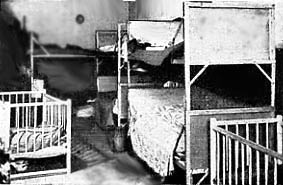
Lithuanian sleeping accommodations in Freimannkaserne (camp)
Photo from Hearken Then Judge by Juozas Pasilaitis, submitted by Frank Passic
Friedrichsort
City archives: Stadtarchiv Kiel, Rathaus
Fleethörn 9-17
24103 Kiel
Tel.: 49-431- 901-3421
Fax: 49-431- 901-63423
Email: stadtarchiv@lhstadt.kiel.de
Hi Olga,
I was surprised and interested to find your email link and read the information about Baltic DP Camps in Germany. I am in the process of doing some research on our DP Camp in
Friedrichsort, (Kiel) Germany where we lived for 5 years to 1949. I am writing a memoir of my early childhood, and wanted to get some more information about the camp. I have some pictures, but as I plan to visit Kiel next year, I would have liked some specific information about the site of the camp, or some pictures. Am I being realistic here? Yes, of course, I am interested in finding out more about my family history, and my own, as much of it is based on a child' memory. Can you tell me anything about your own background? I found the site very interesting and your own comments. Hope to hear from you, Veneranda Kreipans email
Reply from: Wolfgang Strobel, author of Post der befreiten Zwangsarbeiter - Displaced Persons Mail Paid in Deutschland 1945 - 1949:
Friedrichsort (not Friedrichsdorf) forms part of the city of Kiel.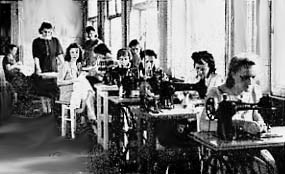 There existed a Student
Camp "Zur Hochbrücke" from
(before?) November 1945 until at least June 1947 with the DPAC (Displaced
Persons Assembly Centre) number 1218 and the UNRRA team number 101.
There existed a Student
Camp "Zur Hochbrücke" from
(before?) November 1945 until at least June 1947 with the DPAC (Displaced
Persons Assembly Centre) number 1218 and the UNRRA team number 101.
From July to November 1948 a camp in the Hipper Barracks (Kaserne) is listed with the DPACCS number 19/121. Probably it existed also before and after this time period.
Freilassing
Oct. 1, 2013
Hanna Abaszidze (nee Trebert) 1916-195Hanna was born in Warsaw, and married in 1937 to Wachtang Abaszidze, a Captain of the 13th Division of the Polish Army. She is a distant relative of my wife, whose family history I am researching. I hope this post may generate some additional info about Hanna. Wachtang was Georgian, having fought in the Russian Civil War 1917-20 on the White Russian side, and escaped via Constantinople to be recruited into the new Polish Army. Captured in September 1939, he was released in December 1939. Hanna and Wachtang passed the war in Warsaw, but so far as one can gather they drifted apart towards the end. Hanna managed to get away from Warsaw before the Uprising broke out on 1st August 1944, and at the end of the war found herself in the area east of Munich. As she spoke several languages fluently, she quickly found herself employed by the American forces as an interpreter, and then soon joined the International Refugee Organisation as a welfare officer (see photo below).
She worked in various camps from 1945 to 1950, so far as I can identify, as follows: Hammerau, Murnau, Freilassing, Laufen, Ainring and Bad Reichenhall. She was employed at Bad Reichenhall twice, and this was her last posting when on Saturday 13 May 1950 she drowned in a river above Bad Reichenhall trying to save the dog of a friend which had fallen into the river. She had a very large funeral, and people came long distances to attend. She would have been very well known in the camp network, being an outgoing and gregarious personality. She was buried at St Zeno Church in Bad Reichenhall, where a stone on her grave was maintained by someone until about 2006. I found the site of her grave a few years ago.
I have asked for this information to be posted on the Dpcamps website in the hope that it may ring bells with people interested in any of the camps listed. Maybe fragments of information exist here and there which will help me build up a richer picture of this young woman whose life was cut off so prematurely.
Eamonn Judge ejjudge@googlemail.com
Freising
July 14, 2008 Hello Olga,
It is an extraordinary story that brings me to contact you, two years after a
message concerning the UNRRA team 306 was sent to Nicky Langley, who contacted
Janie, who took up with you. To make the story short: renewing the roof of a
house in the Bruges residential area, a series of photos were found, hidden in
the inner roof protection.
After searching a while, I got the names of the team members: the confirmation came with the last message of Janie. These photos could be related with a nurse, former nun (The nun’s story), who integrated resistance during the war and the UNRRA after.
It is rather difficult to find out who put the photos on this place, so we are trying to identify the persons on the photos. Could you help me by presenting them on your DP site with the request to identify them? In Bruges I am blocked by the “100 years” private protection law. So I am still hoping that one of the survivors can identify these persons and continue this exceptional story.
Could it be the beginning of a “after nun’s story”? Already
many thanks.
François des Touches des.touches@skynet.be, Belgium
Hi Olga and François,
As requested I have resized the photos I received yesterday and they are attached.
I did a little more research and found this web-site that has a few photos from
DP Camp Freising
maybe you can see if any of your photos match up with these, the site is: www.liebowitzes.com
janie :-)
kdo. Dachau
Freising, Landrat - aircraft industry
http://en.wikipedia.org/wiki/Freising
Frille (British zone)
Fulda Bistumsarchiv Fulda Mailing address:Postfach 147
36001 Fulda
Visitors address:
Bischöfliches Generalvikariat
Paulustor 5
36037 Fulda
City archive: Stadtarchiv Fulda
Palais Buttlar, Bonifatiusplatz 1-3
36037 Fulda
Dear Olga, My wife, also Olga, was in the Wildflecken camp in 1947 and then went to DP camp Fulda in 1949. From there to Bremerhaven where she got on a ship with her parents to come to the U.S. in 1949. I can't find any mention of a camp Fulda in my searches. Have you any info on it? Thank You, Steve Maurer, Arkansas
Olga, I came across your site, while looking for information about DP Camp Fulda. I was born in Wildflecken, my sister was born in Fulda, but sadly she died at 8 months. We were moved around to a number of camps, before coming to Australia in Aug 1949. Will be travelling to Germany, in August 2004. Have organized my visit to Wildflecken, will be staying at"am Dreistelz" for a couple of days. Also going to Fulda, and hope to find DP Camp site. Received information from Germany, about my sister's gravesite, so I will be heading there also. When I finish doing my personal journey, I return to Frankfurt, and start an 8 day tour of Germany. After that head to Poland and visit my relations. Any information you can give me regarding Fulda would be greatly appreciated. Thank you, Teresa Adams, Brisbane, Australia.
Funk Kaserne Emigration & Repatriation Center, Munich - check the Munich archives. http://www.dpcamps.org
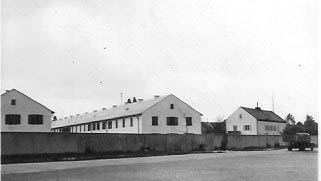
Funk Buildings 1
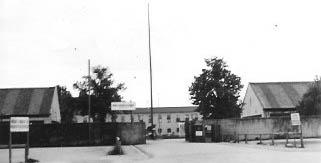
Funk Buildings 2
https://de.wikipedia.org/wiki/Funkkaserne - Click translate this page from German to English.
"Funk Kaserne, a camp designated for
processing applicants seeking to be settled abroad. They were billeted at Funk
Kaserne while their medical examinations were undertaken. They reported back
to the office, as directed, where a staff member, who spoke Ukrainian, whom
they had met on arrival, informed them of appointments for medical examinations.
After separate medical examinations by an English-speaking doctor who worked
with an interpreter fluent in Ukrainian, they were given appointments for x-rays,
which were repeated for Mr. _______, and the reports of those they returned
to the camp office. They were told to remain at Funk Kaserne pending advice
whether they would be accepted to come to Canada. Any forms completed at Funk
Kaserne were filled out for them by office staff fluent in Ukrainian and English.
In the latter language the [applicants] were not then literate." Taken
from Federal
Court of Canada http://decisions.fct-cf.gc.ca/fct/2001/2001fct138.html [no longer on line].
tracesofevil.com
search.archives.un.org/
Hello, any information of a camp Funk Kaserne Munich, Germany? I believe it was used as a resettlement camp. Regards, E. Hutchins
4/17/05 Dear Mrs. Kaczmar:
I was trying to find some information regarding a German DP camp where my father's family lived from around 1944 - 1950, and I came across your wonderful web site. My aunt told me the name of the camp was Funk Kaserne. During the time my dad's family lived in this camp, my aunt told me it was dedicated to Armenian refugees only. Based on the information I read on your site, it appears that this camp housed different immigrant groups at one time or another. Do you have any other information regarding this camp? Or do you know of any other sources that I may contact with respect to Funk Kaserne? Your attention to this matter is appreciated. Regards, John Grigorian
Jan. 7, 2018
Hi. I am searching for records on the Funk Kaserne (radio barracks) camp during 1951-1952. My father in law was adopted from this camp. His legal guardian in the camp was Ellen TRIGG VISSER. His mother was Margot Helma Hass. He was born 1948. Any information that you can me with would be greatly appreciated.
Thank you for your help! Erica May ericahmay@gmail.com
Furikschulle-Munchen some Ukrainian documentation at Shevchenko Scientific Society Library
Fürth / Fuerth near Nürnberg; Jews Landkreis FürthKreisarchiv Fürth, Landratsamt für den Landkreis Fürth,
Stresemannplatz 11, 90768 Fürth Fürth (kreisfreie Stadt)
City archive: Stadtarchiv Fürth, Schloshof 12, 90768 Fürth
This is the link to
the Jewish museum Fürth:
Jüdisches Museum Franken http://www.juedisches-museum.org/ It has a English language link





